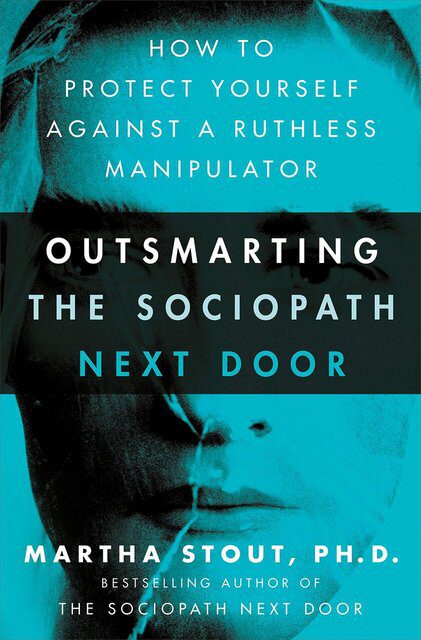Martha Stout, Ph.D. is a clinical psychologist in private practice and a foremost authority on the subject matter of sociopathy. She served on the faculty in psychology in the department of psychiatry at Harvard Medical School for twenty-five years. Stout specializes in recovery from psychological trauma, post-traumatic stress disorder, and suicide.
Dr. Stout has written the following books:
- Outsmarting the Sociopath Next Door – Outsmarting the Sociopath Next Door: How to Protect Yourself Against a Ruthless Manipulator (2020)
- The Paranoia Switch: How Fear Politics Rewires Our Brains and Reshapes Our Behavior and How We Can Reclaim Our Courage. (2007)
- The Sociopath Next Door: The Ruthless Versus the Rest of Us, (2005)
- The Myth of Sanity: Divided Consciousness and the Promise of Awareness, (2001)
The Prevalence of Sociopathy
There are more sociopaths among us than people who suffer from the much-publicized disorder of anorexia, four times as many sociopaths as schizophrenics, and one hundred times as many sociopaths as people diagnosed with a known scourge such as colon cancer.
In The Sociopath Next Door, Dr. Stout reveals that a shocking 4 percent of ordinary people—one in twenty-five—has an often undetected mental disorder, the chief symptom of which is that that person possesses no conscience. He or she has no ability whatsoever to feel shame, guilt, or remorse. One in twenty-five everyday Americans, therefore, is secretly a sociopath. They could be your colleague, your neighbor, even your family. And they can do literally anything at all and feel absolutely no guilt.
“4 percent of the general population has antisocial personality disorder (ASPD, sociopathy, or psychopathy).”
About one in twenty-five individuals are sociopathic, meaning, essentially, that they do not have a conscience. It is not that this group fails to grasp the difference between good and bad; it is that the distinction fails to limit their behavior. The intellectual difference between right and wrong does not bring on the emotional sirens and flashing blue lights, or the fear of God, that it does for the rest of us. Without the slightest blip of guilt or remorse, one in twenty-five people can do anything at all.

What is Sociopathy?
Sociopathy is, at its very essence, ice-cold, like a dispassionate game of chess. In this way, it is different from ordinary duplicitousness, narcissism, and even violence, which are often full of emotional heat. If necessary, most of us would lie to save the life of someone in our family, and it is something of a cliché to point out that a violent gang member (as opposed, perhaps, to his sociopathic leader) may conceivably feel loyalty and warmth toward the members of his gang, and tenderness for his mother and siblings.
“The only emotions that sociopaths seem to feel genuinely are the so-called “primitive” affective reactions that result from immediate physical pain and pleasure, or from short-term frustrations and successes. ”
A sociopath is someone who “fails to conform to social norms,” or who is “never monogamous,” or who “fails to honor financial obligations,” for the straightforward reason that an obligation of any kind is something one feels toward beings, or toward a group of beings, who matter emotionally. And to a sociopath, we simply do not matter.
People without conscience experience emotions very differently from you and me, and they do not experience love at all, or any other kind of positive attachment to their fellow human beings. This deficit, which is hard even to ponder, reduces life to an endless game of attempted domination over other people.
Sociopathy stands alone as a “disease” that causes no disease for the person who has it, no subjective discomfort. Sociopaths are often quite satisfied with themselves and with their lives, and perhaps for this very reason there is no effective “treatment.” Typically, sociopaths enter therapy only when they have been court-referred, or when there is some secondary gain to be had from being a patient. Wanting to get better is seldom the true issue. All of this begs the question of whether the absence of conscience is a psychiatric disorder or a legal designation—or something else altogether.
“Sociopathy is more than just the absence of conscience, which alone would be tragic enough. Sociopathy is the inability to process emotional experience, including love and caring, except when such experience can be calculated as a coldly intellectual task.”
Who is a Sociopath?
In Outsmarting the Sociopath Next Door: How to Protect Yourself Against a Ruthless Manipulator, Stout writes:

According to a newer (2013) version of the manual (DSM-5), antisocial personality disorder is “characterized by a pervasive pattern of poor social conformity, deceitfulness, impulsivity, criminality, and lack of remorse” and is diagnosable when three or more of the following seven “pathological personality traits” are present:
- Manipulativeness: Frequent use of subterfuge to influence or control others; use of seduction, charm, glibness, or ingratiation to achieve one’s ends.”
- Deceitfulness: Dishonesty and fraudulence; misrepresentation of self; embellishment or fabrication when relating events.
- Callousness: Lack of concern for feelings or problems of others; lack of guilt or remorse about the negative or harmful effects of one’s actions on others; aggression; sadism.
- Hostility: Persistent or frequent angry feelings; anger or irritability in response to minor slights and insults; mean, nasty, or vengeful behavior.
- Irresponsibility: Disregard for—and failure to honor—financial and other obligations or commitments; lack of respect for—and lack of follow-through on—agreements and promises.
- Impulsivity: Acting on the spur of the moment in response to immediate stimuli; acting on a momentary basis without a plan or consideration of outcomes; dificulty establishing and following plans.
- Risk-taking: Engagement in dangerous, risky, and potentially self-damaging activities, unnecessarily and without regard for consequences; boredom proneness and thoughtless initiation of activities to counter boredom; lack of concern for one’s limitations and denial of the reality of personal danger.
In the Sociopath Nextdoor, Stout describes 13 Rules for Dealing with Sociopaths in Everyday Life:
1. The first rule involves the bitter pill of accepting that some people literally have no conscience. These people do not often look like Charles Manson or a Ferengi bartender. They look like us.
2. In a contest between your instincts and what is implied by the role a person has taken on—educator, doctor, leader, animal lover, humanist, parent—go with your instincts.
Whether you want to be or not, you are a constant observer of human behavior, and your unfiltered impressions, though alarming and seemingly outlandish, may well help you out if you will let them. Your best self understands, without being told, that impressive and moral-sounding labels do not bestow conscience on anyone who did not have it to begin with.
3. When considering a new relationship of any kind, practice the Rule of Threes regarding the claims and promises a person makes, and the responsibilities he or she has. Make the Rule of Threes your personal policy.
One lie, one broken promise, or a single neglected responsibility may be a misunderstanding instead. Two may involve a serious mistake. But three lies say you’re dealing with a liar, and deceit is the linchpin of conscienceless behavior. Cut your losses and get out as soon as you can. Leaving, though it may be hard, will be easier now than later, and less costly.
Do not give your money, your work, your secrets, or your affection to a three-timer. Your valuable gifts will be wasted.
4. Question authority.
Once again—trust your own instincts and anxieties, especially those concerning people who claim that dominating others, violence, war, or some other violation of your conscience is the grand solution to some problem.
The good news is that having social support makes people somewhat more likely to challenge authority. Encourage those around you to question, too.
5. Suspect flattery.
Compliments are lovely, especially when they are sincere. In contrast, flattery is extreme and appeals to our egos in unrealistic ways. It is the material of counterfeit charm, and nearly always involves an intent to manipulate. Manipulation through flattery is sometimes innocuous and sometimes sinister. Peek over your massaged ego and remember to suspect flattery.
Just as an individual pumped up on the flattery of a manipulator is likely to behave in foolish ways, exaggerated patriotism that is flattery-fueled is a dangerous thing.
6. If necessary, redefine your concept of respect.
Let us use our big human brains to overpower our animal tendency to bow to predators, so we can disentangle the reflexive confusion of anxiety and awe. In a perfect world, human respect would be an automatic reaction only to those who are strong, kind, and morally courageous. The person who profits from frightening you is not likely to be any of these.
Too often, we mistake fear for respect, and the more fearful we are of someone, the more we view him or her as deserving of our respect.
7. Do not join the game.
Intrigue is a sociopath’s tool. Resist the temptation to compete with a seductive sociopath, to outsmart him, psychoanalyze, or even banter with him. In addition to reducing yourself to his level, you would be distracting yourself from what is really important, which is to protect yourself.
8. The best way to protect yourself from a sociopath is to avoid him, to refuse any kind of contact or communication.
Sociopaths live completely outside of the social contract, and therefore to include them in relationships or other social arrangements is perilous. Begin this exclusion of them in the context of your own relationships and social life. You will not hurt anyone’s feelings. Strange as it seems, and though they may try to pretend otherwise, sociopaths do not have any such feelings to hurt.
You may never be able to make your family and friends understand why you are avoiding a particular individual. Sociopathy is surprisingly difficult to see, and even harder to explain. Avoid him anyway.
9. Question your tendency to pity too easily.
Respect should be reserved for the kind and the morally courageous. Pity is another socially valuable response, and it should be reserved for innocent people who are in genuine pain or who have fallen on misfortune. If, instead, you find yourself often pitying someone who consistently hurts you or other people, and who actively campaigns for your sympathy, the chances are close to 100 percent that you are dealing with a sociopath.
10. Do not try to redeem the unredeemable.
At some point, most of us need to learn the important, if disappointing, life lesson that, no matter how good our intentions, we cannot control the behavior—let alone the character structures—of other people. Learn this fact of human life, and avoid the irony of getting caught up in the same ambition he has—to control.
Second (third, fourth, and fifth) chances are for people who possess conscience. If you are dealing with a person who has no conscience, know how to swallow hard and cut your losses.
11. Never agree, out of pity or for any other reason, to help a sociopath conceal his or her true character.
“Please don’t tell,” often spoken tearfully and with great gnashing of teeth, is the trademark plea of thieves, child abusers—and sociopaths. Do not listen to this siren song. Other people deserve to be warned more than sociopaths deserve to have you keep their secrets.
“We tend to experience “You owe me” as a compelling claim, but it is simply not true. Do not listen. Also, ignore the one that goes, “You are just like me.” You are not.”
12. Defend your psyche.
Do not allow someone without conscience, or even a string of such people, to convince you that humanity is a failure. Most human beings do possess conscience. Most human beings are able to love.
13. Living well is the best revenge.

In Outsmarting the Sociopath Next Door: How to Protect Yourself Against a Ruthless Manipulator, Stout highlights ten key guidelines for dealing with the sociopath:
TEN KEY GUIDELINES WHEN YOU MUST FIGHT A SOCIOPATH
- GUIDELINE #1: UNDERSTAND THE PERSON YOU ARE DEALING WITH
- GUIDELINE #2: UNDERSTAND THAT YOU ARE ON THE SIDE OF GOOD; ENVISION A MISSION.
- GUIDELINE #3: CHANGE THE GAME.
- GUIDELINE #4: FOCUS CLEARLY ON YOUR OWN GOAL.
- GUIDELINE #5: DO NOT GIVE THE SOCIOPATH WHAT HE OR SHE WANTS.
- GUIDELINE #6: ENLIST OTHERS.
- GUIDELINE #7: UNDERSTAND THAT THIS MISSION IS ONLY ONE PART OF YOUR LIFE RIGHT NOW.
- GUIDELINE #8: DO NOT CATASTROPHIZE.
- GUIDELINE #9: TAKE CARE OF YOUR HEALTH.
- GUIDELINE #10: PROTECT YOURSELF FROM VIOLENCE.
The sociopath is winning each time you do any of the following:
- Fail to understand his true nature
- Play by his rules
- Lose sight of your real goals
- Let him see your anger, your confusion, or your hurt
- Remain isolated and attempt to go it alone
- Spend all your time and energy dealing with or thinking about him
- Lose your balance and set impossibly huge tasks for yourself
- Lose your patience (which is a virture you are developing)
- Allow yourself to panic or catastrophize (imagine outcomes far worse than any that are likely)
- Allow yourself to remain so stressed that your functioning is affected or you get sick altogether
- Lose your guiding sense of the meaning, history, and shared experience of what you are doing (your “mission”)
Looked at the other way around, you are winning each time you do any of the following:
- Remind yourself of the objective information you have learned about sociopaths
- Reflect on the fact that your conflict with this ruthless individual is part of a much larger and older contest between human connection and hollowness
- Change the game on the sociopath (redefine what it means to win)
- Focus on your own goal instead of his
- Shield your emotions from the sociopath
- Strengthen ties with people who do possess conscience and empathy
- Divide your mission into doable steps
- Pace yourself
- Remain rational and pragmatic
- Attend to your health by practicing a stress-reduction technique
“We tend to conjure entirely the wrong images when we try to keep ourselves safe from those who commit horrors. Assaultive and violent sociopaths, though a small minority, constitute a compelling reason to raise our awareness of the sociopathic pattern.”
It is tough spotting the sociopaths amongst us because they are close to all of us, they are our spouses, family members, siblings, co-workers, bosses, friends, cousins, teachers, religious leaders, and neighbors. We are mostly empaths and the sociopath exploits our empathy to emotionally abuse us. They gaslight, play the pity game, shed crocodile tears, they are great actors and they are extremely manipulative.
The key to navigating the roller coaster of dealing with the sociopath is to get more self-aware, study personality types, prioritize your self-care, and avoid the amount of time you spend with these people. As American Poet Maya Angelou observed, “When people show you who they are, believe them”. The challenge for most of us is that we do not see beyond the cute smile, the mask, and the facade.
Heed the advice of Dr. Stout “Three strikes and you are out”. If someone repeatedly manipulates, lies, deceive, and controls you, it means that might not be right for you or necessary in your life. If you continue to give people, the benefit of the doubt; they would eventually get the benefit while you get the doubt. Prioritize your self-awareness, self-care, be vigilant and trust your guts.
All the Best in your quest to get Better. Don’t Settle: Live with Passion.



Comments are closed.